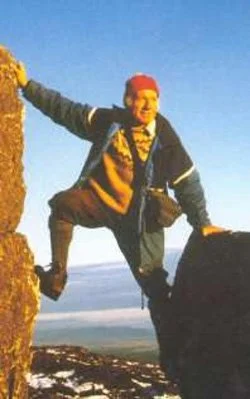Park Stories: Tom Weir
Tom Weir Statue, Balmaha
The first ever presentation of the Oliver Brown Award was made to Tom Weir, the climber, naturalist, explorer, writer and unshakeable patriot on Saturday 19 March 1983 in the Terraces Hotel, Stirling. Over 70 guests - including Mrs Margaret Brown, Oliver's widow and his daughter Una - saw Tom Weir receive both an engraved Edinburgh Crystal decanter and a cheque for £100. Guest speakers at the Dinner were Gavin Kennedy, Jim Lynch and Colin Swan - the SIs "Agent of the Year", who received a personally inscribed copy of Tom Weir's book 'Scotland'.
Tom Weir was born in Springburn, Glasgow in 1914. The son of a locomotive engineer fitter, he belonged to the first generation of working-class outdoor men and began his career tramping the hills near the city whenever he could escape from the grocers shop where he worked. After war-time service he worked as a surveyor for the Ordnance survey before commencing a full-time career as a writer, photographer and climber.
In 1950 he was a member of the first post-war Himalayan expedition and in 1952 was one of the first mountaineers to explore the hitherto closed ranges of Nepal, east of Katmandu.
His travels have taken him to the High Artic of East Greenland, the peaks of Northern Norway, the High Atlas of Morocco and the troubled frontier of the Iran, Syrian and Turkish Mountain lands known as Kurdistan.
He won the Scottish Television Personality of the Year Award in 1978 for his programme 'Weir's Way' (still being shown). Author of many books on climbing and Scotland, his first love has always been the outdoor life in Scotland, enjoying the scenery, wildlife and natural history. His regular column, for over fifty years, in the Scots Magazine won him many friends and admirers worldwide.
Friends of Loch Lomond & The Trossachs, working with the Tom Weir Memorial Group installed a statue at Balmaha, Loch Lomond (pictured above) to celebrate the life of this much-loved broadcaster and mountaineer.
Tom Weir, broadcaster, mountaineer and conservationist in conversation with Jenny Taggart
A few days after his ninetieth birthday ceilidh I have the pleasure to meet the diminutive Tom Weir, resplendent in his trade mark woolly bunnet, fair-isle jumper and nicky-tams. He is sprightly and energetic, keen for conversation and eager to enjoy birthday cake and tea made by his wife, Rhone.
His earliest recollection is of his grandmother who would give him a penny to sing ‘Rowan Tree’. “I can still sing it today” he laughs. He remembers as a child wanting to climb - anything, anywhere. His mother loved mountains and together the pair would escape Glasgow. A short bus journey would take them from their home in Springburn to the Campsite Hills, a place that is still a favourite of Tom’s today. A commemorative cairn now marks the start of ‘Weir’s Walk’ from Clachan of Campsie through the hills. From his earliest days, he also remembers wanting to be a writer. Here he was helped by another member of his strongly matriarchal family. His elder, and equally weel-kent sister, Mollie, taught him to touch-type, charging him two shillings and sixpence a lesson. “It was money well spent”, he says.
I ask about his experience as a Battery Officer in the Royal Artillery in the Second World War. “I was in action in Italy. They don’t let you off, you know. We were called out anytime, day or night. One time the men had really suffered. We were supposed to have an inspection each day, and I said to the men ‘never mind that, you’ve done your bit’. I was back to a private again by the next day because I didn’t get it right. One thing I will never forget, I was in the cinema in Germany and there was an explosion and the whole screen blew right out covering everyone with debris. We fought our way out again. There was the time too when I was in a top bunk and another chap was on the lower. We were bombed and the bomb went straight through the two bunks between us.”
He came back to Glasgow after the war, and began work as a surveyor. But he was soon able to support himself by his writing, and in1950 took part in the first post-war Himalayan expedition. In 1952, he was one of the first to explore the mountains of Nepal and Katmandu. Some of his most difficult ascents were there. He also climbed in Greenland above the Arctic Circle, in Morocco, Iran, Syria and Kurdistan, as well as in Scotland. He says he likes the challenge of the climb and the achievement of reaching the summit.
Despite being one of Scotland’s foremost mountaineers, he was never a Munro-bagger. He has been to the top of most Munros, but preferred to climb only those he liked best, enjoying the whole experience of the sky, the lochs, trees, birds, flowers, animals – the spiritual as well as the physical. For example, the tiny 142-metre Duncryne, known locally where he lives in Gartocharn as ‘The Dumpling’, has been important always to him. “I used to climb Duncryne every day, sometimes even at midnight.” I ask him if this is his favourite place in Scotland. “No”, he replies, “That honour goes to Glen Lyon. It is a beautiful place. I call it ‘the three Ls’: the loveliest, the longest and the loneliest. I like to walk there because of the loneliness.”
He believes climbing should be safer today than fifty years ago because of better clothing and equipment. But this has had the contrary effect that climbers may now extend themselves beyond their ability to prove how good they are. Consequently, they can be in greater danger. He says, “For me, it was never what I did, but what I saw, that was important”. Tom was injured only once in his life, rock climbing on Ben A’an in the Trossachs. Recalling the incident, he said, “It is a difficult climb. We were just starting and I hadn’t got the feel of the mountain. I missed a vital hold and fell forty feet. I nearly lost my life, but it was my own fault. I was climbing without a belay. I never did that again”.
Tom Weir has been given many awards. He has received the Scots Independent Oliver Award in 1983 for advancing the cause of Scotland’s self-respect. He has an MBE. He was awarded STV’s personality of the year in 1978 for Weir’s Way, a programme that introduced the Scottish countryside to many Scots whose lives had given them no prior knowledge or experience of it. He is most proud of The John Muir Trust Award given him in 2000. The award, proudly displayed in his home, is inscribed “Presented to Tom Weir in recognition of his contribution to the wider understanding of the value of Scotland’s wild places”. The John Muir Award is not given annually, and has only been given twice in the twenty-one years of the organisation’s existence in this country. Tom was the first recipient. All of their married life he and Rhona have lived on the shores of Loch Lomond. Concerned that the area should be protected, Tom campaigned to see the setting up of the National Park. He is proud that this has come to pass and believes that the Park is necessary for management of the land, the flora and the fauna. He also campaigned to safeguard the Cairngorms and Glen Nevis.
I ask Tom if he believes in Scottish Independence. He replies “Scotland could easily do it. It has everything. There is no reason why we can’t look after ourselves. I believe we should, but I have never been actively involved in politics”.
“Do you believe in God?” I ask. He is sure of his answer: “No. Everyone has one life. That’s all it is. No spirit looks after you beyond death. I was lucky not to have been killed in the war. I was lucky not to have been killed on Ben A’an. I don’t believe the world will be in existence in another one hundred years. Man is outliving himself. The atomic bombs dropped on Nagasaki and Hiroshima were terrible. Now climate change is destroying the world. I have lived long enough to see the difference from when I was young. Life was more free then.”
What is the secret of a long life, I wonder? “Good health, good friends, and enough money to live at your own level. Always be doing something you enjoy doing. Good and happy memories”. Has Tom Weir, legend in his own lifetime, enjoyed his life? “I enjoy it still. Every morning I wake up and there is something else to do”.
The secret of long life is always be doing something you enjoy.
Scots Independent February 2005
Tom Weir was small of stature but his death last week, aged 91, cast an enormous shadow across his beloved Scotland. He was held in the highest regard by all his fellow Scots. His books, monthly articles for more than 50 years in the Scots magazine and his programmes on Scottish Television ensured that the byornar Springburn-born climber, environmentalist, author, broadcaster and Nationalist was known to every Scottish household. Scottish National Party Leader Alex Salmond MP well summed up the Nation’s feeling of loss –
“He will be sadly missed throughout Scotland not only by country lovers but all Scots. My thoughts are with his family at this time.”
Tom Weir was the first-ever recipient of the Oliver Brown Award, presented annually by the Scots Independent, in 1983. I had the honour of being one of the three judges on that occasion, along with SI Editor Colin Bell and Professor Gavin Kennedy. All afternoon, over a refreshment or two, we debated the merits of the strong list of nominations for the initial award but always came back to the same name – Tom Weir. He set the bench-mark for the high standard of all those who followed in his footsteps as Oliver winners.
He was an inspiration to us all. He loved all aspects of our country, but particularly the hills, glens, lochs and wildlife of Scotland. Through his writing, television programmes, slide-shows and talks, he passed that love for and delight in Scotland to his fellows. He would finish his talks with a plea for an Independent Scotland in order to protect the future of the scenes he had shown and described.
He was the best of Scots and represented all that is good in our Nation. He spread enlightenment and joy wherever he went and will live on in our memories.
In his will Tom Weir left over £2,000 to Friends of Loch Lomond and £5,000 to the John Muir Trust – two causes close to his heart. In 2000, he was the first recipient of the John Muir Trust’s Lifetime Achievement Award in recognition of his environmental work. The Trust Chief Executive Nigel Hawkins said that the bequest would be used to preserve areas close to Tom Weir’s heart.
He further said:
“It is a wonderful gesture from Tom and is greatly appreciated. He was a great supporter of the Trust’s work and a great man of the mountains. Tom was loved by all hill walkers and was held in the highest regard. The bequest will be put towards something Tom loved, namely the grand mountains of Scotland.”
The John Muir Trust is regarded as one of Scotland’s leading guardians of wild land and wild life.


